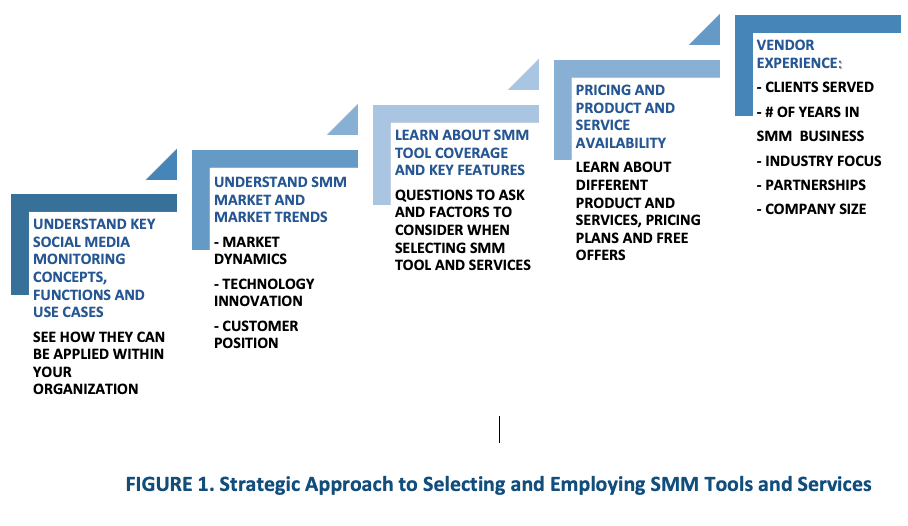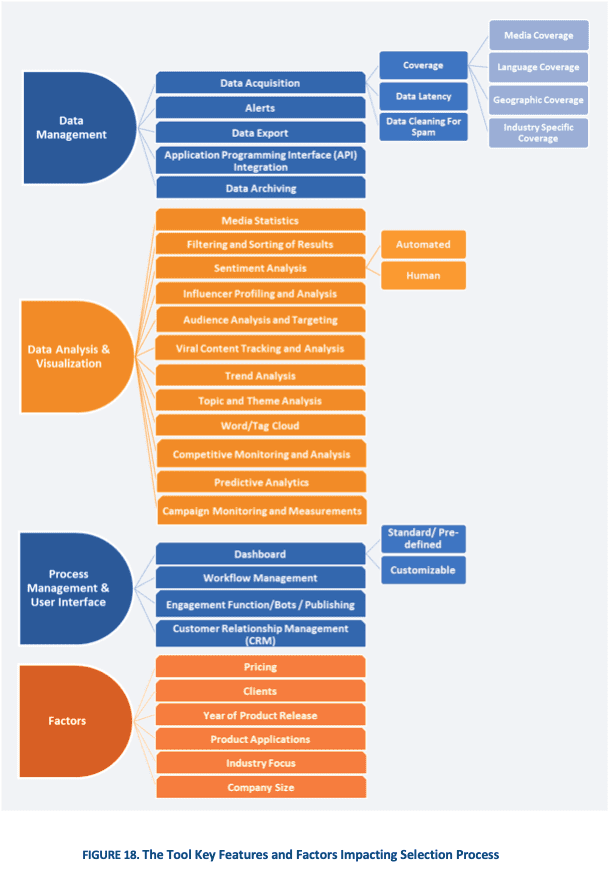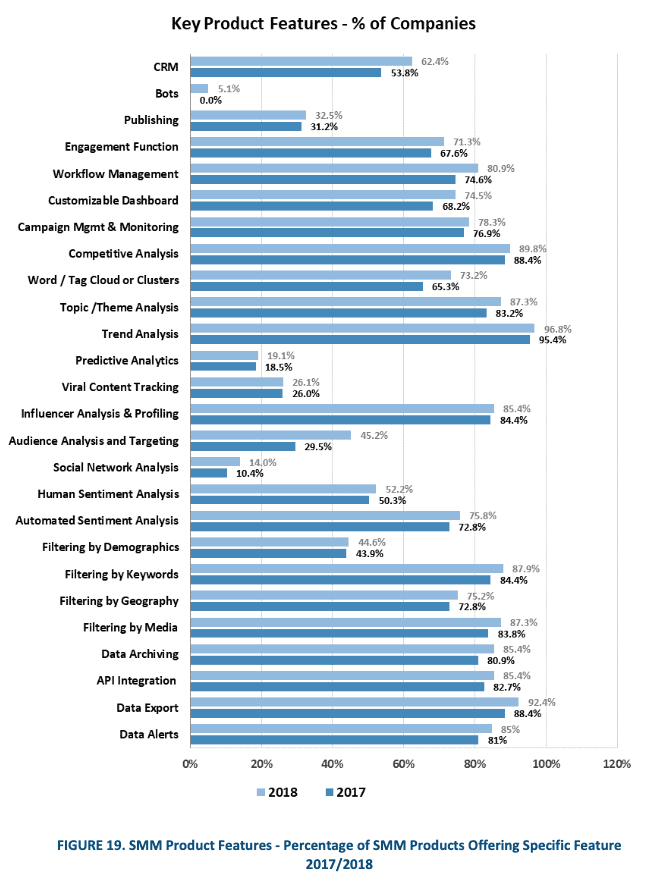The updated report elaborates the why, what and how of selecting social media listening and engagement platforms
Social media has been evolving rapidly and presenting a wide range of new challenges and opportunities for businesses to capture the attention of customers.
A series of developments, ranging from major acquisitions and closures, new privacy regulations, increasing adoption of AI; a rise of messaging apps and "dark social", the decline of social sharing and organic reach, to name a few, have been disrupting and shaping the industry. In order to stay competitive and make more informed strategic decisions, continuous learning and new approaches are required to master new social technologies and developments.
In order to enable companies and individuals to understand the market and make effective decisions about the selection and use of social media monitoring tools and services, this November’s Social Media Monitoring (SMM) Tools and Services Report 2018 by Ideya Ltd provides an overview and comparison of social media technologies. It is the most comprehensive report currently available on the market, offering analysis, comparison and elaborate profiles of 157 SM tools and services.

The 63 page-long report extract below, also published on Scribd has a good level of detail on how to approach the selection process, a listing of all tools and detailed sample profiles of four tools (out of 157 profiles available in the full report). Those that are included in this year Excerpts are (1) BoomSonar, BoomSonar SA, (2) NodeXL, Social Media Research Foundation, (3) Ubermetrics, Ubermetrics Technologies GmbH, and (7) YouScan, YouScan Limited.
What are social media listening and monitoring tools?
Simple Social Media Monitoring (SMM) platforms provide a basic capability of capturing online and social conversations revealing mentions about your brand, topic of interest, companies, products or competitors based on the specific search query; offering key insights through the analysis of those conversations.
More advanced SMM platforms, on the other hand, may combine several tools and functions and offer listening, monitoring, analytics and often intelligence and engagement capabilities.
Some top vendors are developing features even beyond monitoring, listening and gradually converging with other types of platforms (e.g. content management, social advertising, social media marketing platforms, social customer care, etc.), or creating social suites that integrate several social point solutions within one integrated product that can address multiple social business use cases.
Furthermore, more advanced SMM tools are employing artificial intelligence (AI) in various ways to improve data discovery, data analysis and engagement function to get ahead of the competition. Some forms by which AI is making an entrance into social media marketing and customer care are image recognition, ad targeting, chatbots, smart alerting and tailored recommendations.
As a result of these rapid innovations, making an educated choice about which social technology and services can best address your needs or project objectives has become more complex.
At the beginning of the selection process, it is essential to know what you want the tool to be able to do. To save you time and simplify the process, Ideya has conveniently defined and categorized 157 featured social technologies into 8 classes, based on the type of social tools they offer. They include:
- Social Media Listening Tools,
- Social Media Monitoring,
- Social Media Analytics,
- Social Media Intelligence,
- Social Media Management,
- Social Media Marketing Tools,
- Social Media Customer Care Tools, and
- Social Suites.
Based on Ideya’s research, the majority of the social platforms and services featured in this report employ social media monitoring tools (85%), while only 10% offer integrated social suites.
How do social media monitoring tools help in marketing campaigns?
SMM tool metrics and measurements are designed to evaluate company activities and inform an overall social media strategy. Companies should develop marketing campaigns based on the insight gained through social media monitoring, focus on the highest potential markets or groups identified through market segmentation and influencer analysis and identify optimal time for engagement.
The metrics may involve statistics about the share, reach, sentiment, impact and speed of conversations about the company. These parameters can be used to assess the company image and perceptions before and after campaign and measure campaign effectiveness and identify trends that lead to new marketing and product tactics. Many tools also offer day parting metrics showing the effectiveness of an outbound message at different times of the day to identify optimum posting time and frequency and some even go further by answering the practical questions of what, when, how and why, making marketers’ social marketing more cohesive and effective.
To measure the value of your social media activities, you should also look at the overall results your company is generating and carefully examine how social media was engaged in increasing your bottom line. This can be through growing revenue and increasing efficiency. Do this by looking at the incremental revenue after a particular promotion, number of conversions, lead generation effectiveness, number of leads per dollar spent vs. traditional advertising campaigns, etc.
In the area of Marketing and Communications, Ideya says that social media monitoring and listening tools typically assist organizations in:
- Acquiring real-time social marketing insights to inform social media marketing and communication plans.
- Optimizing the design of marketing and advertising campaigns based on customer insights and comprehensive audience analysis and targeting, researching the interests, preferences, demographics, and other aspects of an audience group.
- Developing social content strategies to promote products and services and engage with current and potential customers across social media channels in real time.
- Monitoring and applying'word of mouth' consumer recommendations as a form of direct advertising by identifying and engaging with key influencers, generating buzz, and establishing and building relationships with key influencers.
- Making better decisions about campaigns and brand extensions with a clear understanding of the key factors influencing a brand's health.
- Supporting rapid social marketing engagement.
- Developing performance metrics.
I’d add that they’re also useful in getting insight about customer perception of product categories and how your products or services are considered relative to competitors. This can help inform new product development.
As Ideya states in the report, ‘If used properly, social intelligence offered by SMM tools can create true value for businesses by supporting every area of their business. Benefits can range from understanding consumers’ needs and behaviours, competitive landscape, creating risk management plans, increasing customer experience and satisfaction, to executing smart product development and marketing campaigns.’
Depending on the maturity and complexity of the SMM platforms and its key features, some tools can also support social media marketing professionals in social media publishing, business development, sales and lead generation, SMM, analysis and engagement, conversation management, and SEO.
Requirements for social media technologies
So that’s ‘why, what and how’ of social media technologies, but which do you choose? Key features and factors to consider when selecting social media tools are summarized in the following figure:
The Tool Key Features and Factors Impacting Selection Process

The following graph from the Ideya’s Report illustrates how tools differ in terms of product features but also shows that the SMM technologies are continually introducing new product features.

Indeed, the number of tools offering CRM system or allowing integration with other CRM technologies such as Salesforce, SugarCRM, Microsoft Dynamics, Oracle, etc. has grown from 53.8% in 2017 to 62.4% in 2018. Similarly, about 85.4% of SMM tools currently offer API integration - a very valuable option for organizations with complex social media programs, which is 2.7% more than in 2017.
According to the report, audience analysis has experienced the highest growth (15.7%) with 45.2% of SMM tools offering audience analysis in 2018 in comparison to 29.5% tools in 2017.
The number of SMM Tools offering the campaign management and monitoring feature has also increased in the past several years. According to the report, the number of featured tools offering campaign management and monitoring feature has grown from 76.9% in 2017 to 78.3% in 2018, while the number of the tools offering publishing and workflow management capabilities grew by 1.3% and 6.3% respectively.
The Report also offers detailed Selection Process Worksheet to expedite the selection process and make it more relevant to specific business requirements and goals.
For more information, read the Report Excerpts below or download them from Ideya’s Website.
Social Media Monitoring Too... by on Scribd









